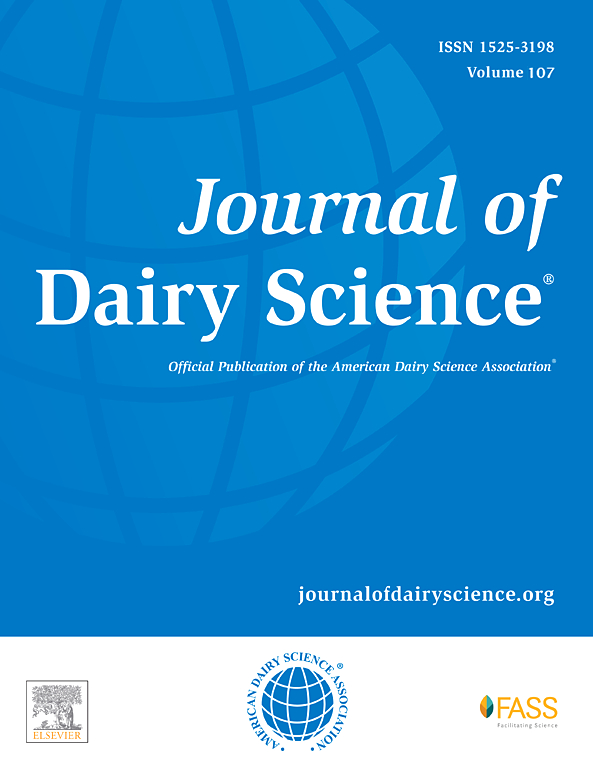基于无标记的蛋白质组学分析揭示了绵羊奶、山羊奶和牛奶的不同蛋白质。
IF 3.7
1区 农林科学
Q1 AGRICULTURE, DAIRY & ANIMAL SCIENCE
引用次数: 0
摘要
鉴于有关绵羊奶、山羊奶和牛奶中物种蛋白质差异的信息有限,本研究利用无标记蛋白质组学技术分析了绵羊奶、山羊奶和牛奶中差异表达的蛋白质及其功能差异,以确定潜在的生物标记物。共鉴定出 770 种蛋白质和 2914 个肽段。统计分析显示,74 种蛋白质在绵羊奶、山羊奶和牛奶中的相对丰度存在显著差异。CSN3 和 LALBA 可作为山羊奶的潜在生物标记物,XDH 可作为牛奶的潜在生物标记物,CTSB 和 BPIFB1 可作为绵羊奶的潜在生物标记物。利用基因本体论和京都基因与基因组百科全书进行的功能分析显示,这些明显不同的蛋白质被不同的途径所富集,包括甲状腺激素合成和甘油磷脂代谢。这些数据揭示了不同物种牛奶蛋白质数量和生理功能的差异,可为乳制品营养成分研究和掺假鉴别技术提供重要依据。本文章由计算机程序翻译,如有差异,请以英文原文为准。
Label-free-based proteomics analysis reveals differential proteins of sheep, goat, and cow milk
Regarding the limited information on species protein differences between sheep, goat, and cow milk, we analyzed the differentially expressed proteins in sheep, goat, and cow milk and their functional differences using label-free proteomics technology to identify potential biomarkers. In all, 770 proteins and 2,914 peptide segments were identified. Statistical analysis showed significant differences in the relative abundances of the 74 proteins among sheep, goat, and cow milk. CSN3 and LALBA can be used as potential biomarkers for goat milk, XDH can be used as a potential biomarker for cow milk, and CTSB and BPIFB1 can be used as potential biomarkers for sheep milk. Functional analysis using Gene Ontology and the Kyoto Encyclopedia of Genes and Genomes showed that these significantly different proteins were enriched by different pathways, including thyroid hormone synthesis and glycerol phospholipid metabolism. The data revealed differences in the amounts and physiological functions of the milk proteins of different species, which may provide an important basis for research on the nutritional composition of dairy products and adulteration identification technology.
求助全文
通过发布文献求助,成功后即可免费获取论文全文。
去求助
来源期刊

Journal of Dairy Science
农林科学-奶制品与动物科学
CiteScore
7.90
自引率
17.10%
发文量
784
审稿时长
4.2 months
期刊介绍:
The official journal of the American Dairy Science Association®, Journal of Dairy Science® (JDS) is the leading peer-reviewed general dairy research journal in the world. JDS readers represent education, industry, and government agencies in more than 70 countries with interests in biochemistry, breeding, economics, engineering, environment, food science, genetics, microbiology, nutrition, pathology, physiology, processing, public health, quality assurance, and sanitation.
 求助内容:
求助内容: 应助结果提醒方式:
应助结果提醒方式:


